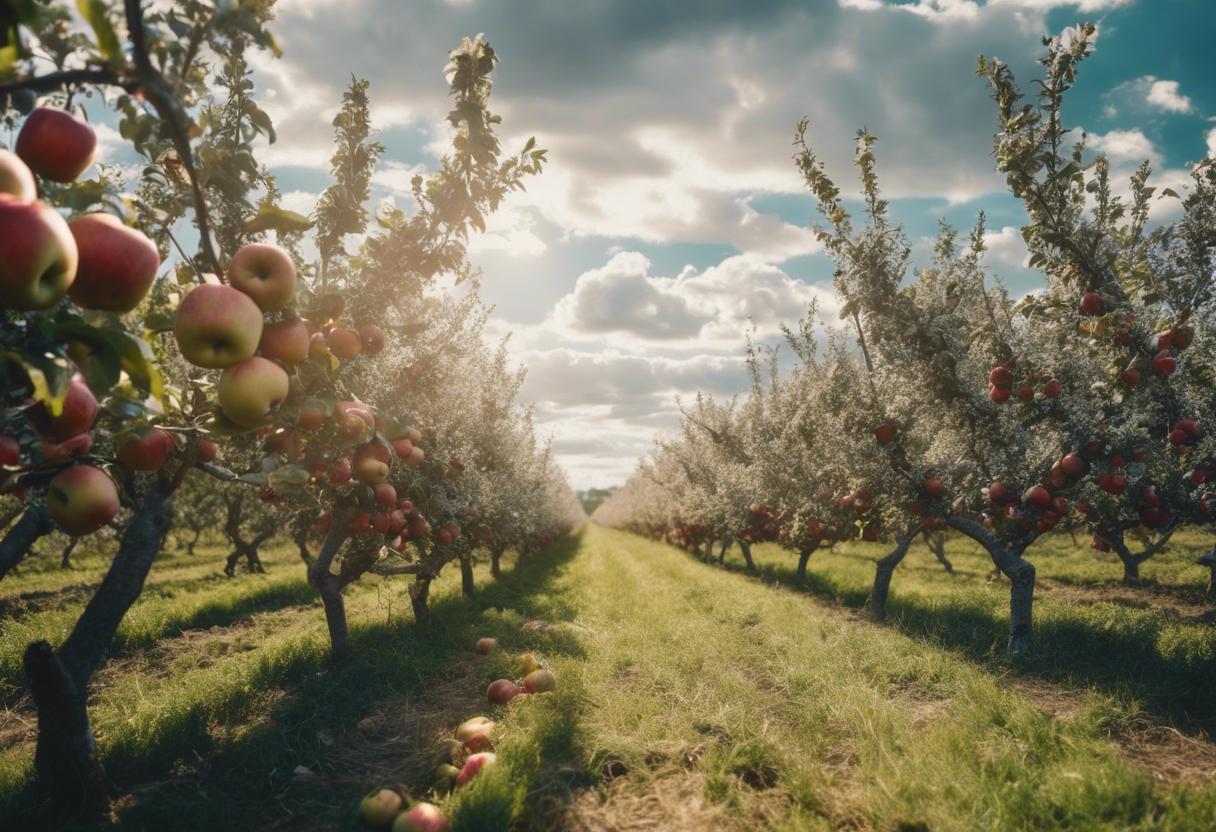Con Traas, an apple farmer based in Co Tipperary, close to Cahir, has been contending with the long-standing issue of crows menacing his crops. Known as farmers’ age-old nemesis, crows are notoriously intelligent creatures that are not easily deterred by typical precautions including scarecrows or loud sounds. However, the day-to-day operations on Traas’s farm, which acts as a campsite in the summertime and features a produce shop, help deter these birds to a degree.
Recently, Traas has had to combat greater and more covert dangers. He has invested €44,000 in erecting anti-hail fences, built with concrete poles, metal wires, and plastic mesh on a half-hectare section of his orchard. As his apple trees are being replanted gradually, these fences will safeguard them from severe summer hailstorms, an all too regular phenomenon brought on by climate change, as experienced in Italy last year when a hailstorm wrecked havoc.
Climate change has posed hitherto unthinkable challenges to farmers. Traas has had to adapt his other farming practices too – his strawberry cultivation for instance. Although resilient, strawberries are susceptible to phytophthora fungi infestation. To eradicate these spores, the soil needs a resting period of a decade. Traas’s farm, spanning 60 acres, can no longer accommodate anymore downtime for soil rejuvenation. The contemporary avoidance of using peat as a substrate has compelled him to resort to coconut coir, a natural fibre derived from coconut husks from Indonesia.
However, this sustainable alternative isn’t without its issues. Shipping it adds to carbon emission; moreover, the Indonesian locals themselves are to a good extent, deprived from its benefits. As Traas quotes, every innovation comes with a new set of challenges.
Coming from a lineage of trailblazers, the Traas family have been advocates of green living before it became a trend. Con’s parents, Willem and Ali Traas, left the Netherlands in the 1960s to explore more expansive and less congested lands as part of the post-war Dutch exodus.
A century’s worth of horticultural knowledge was carried to this southern part of Tipperary by them, a place selected due in part to its existing humble orchard. They were aware of the land’s compatibility with apple trees.
Despite being located in the south, Traas points out that Armagh, the traditional Orchard County, is in the north of Ireland: “Apple trees are not particularly choosy about their location.”
The primary consideration is that “they despise waterlogged roots”. Heavy winter rainfall could inflict stress on the roots and hinder growth. Fortunately, Ireland isn’t as rainy as perceived, at least thus far.
“The precipitation around here is roughly 1,000mm yearly,” he remarks.
His environmental awareness kicked off in the early 1980s.
“When Ronald Reagan paid a visit to Ireland in 1984, my dad, sibling and I headed to Ballyporeen to voice our discontent. There were many intriguing individuals present. I enrolled in Earthwatch back then and Greenpeace later,” he recounts.
The pressing environmental issue then was “the hole in the ozone layer”. However, when he joined UCD to undertake studies in agriscience in 1986, he concurrently commenced his self-education on environmental matters and began to comprehensively understand the scientific reasoning behind phenomena such as shifting seasonal trends, which he had started to observe back home.
Willem Traas, who departed around a decade ago, was a unique kind of farmer. After relocating to Ireland as an adult, he took the Leaving Cert English test (“and scored a C”).
He penned down poetry and even had his works published once in the Sunday Tribune. He was instrumental in the inception of the Clonmel Literary Society, a community of writers who exchange feedback on each other’s creations.
Notwithstanding, he was passionate about farming – a love that Con believes is fueled by the occupation’s appeal to creative minds. Although Traas jnr doesn’t engage in writing, he has plenty to keep him busy.
As it is officially termed, “The Apple Farm” features a store that retails not just fruits but also homemade juice, cider, and other locally produced food items, such as O’Donnell’s crisps.
Its seasonal campsite, set to close for the season this coming weekend, accommodates 30 pitches. Con has seen casual visitors including Asians and Bangladeshis who travel from neighbouring towns to enjoy and take photographs among the apple trees.
“I suspect it’s a part of their culture,” he theorizes.
The farm functions all year round with a workforce of 20, which increases by five during summertime. In contrast to post-Brexit fruit establishments in the UK, this farm has yet to experience a workforce shortage.
In one instance, the speaker refers to a freshly-picked vibrant red apple with earwigs swirling around its branch as his “pest-control brigade”. The role of these insects is to consume all the aphid eggs, with around 5 to 6 million of them under his supervision.
However, impending climate change creates unique challenges that even Traas is unable to address. An inevitable issue that he predicts is the end of affordable food. This prospect greatly concerns him.
His words, conveying his apprehension, are “We already have more than enough right-wing extremists as it stands.”

